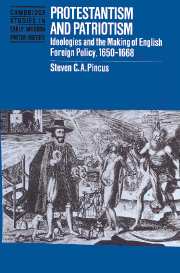Book contents
- Frontmatter
- Contents
- Acknowledgments
- List of abbreviations
- 1 Introduction
- Part I The rod of the Lord: ideology and the outbreak of the First Anglo-Dutch War
- Part II To unite against the common enemy: the 1654 Treaty of Westminster and the end of apocalyptic foreign policy
- Part III Popery, trade, and universal monarchy: ideology and the outbreak of the Second Anglo-Dutch War
- Part IV The Medway, Breda, and the Triple Alliance: the collapse of Anglican Royalist Foreign Policy
- 17 Historiographical overview
- 18 The circulation of news and the course of the war
- 19 The popular understanding of the war
- 20 The government's war aims
- 21 An Orangist revolution
- 22 Victory denied and wartime consensus shattered
- 23 The rise of political opposition
- 24 The road to Chatham: the decision not to send out a battle fleet
- 25 The demise of Anglican Royalist foreign policy
- Conclusion
- Bibliography
- Index
- Titles in the series
23 - The rise of political opposition
Published online by Cambridge University Press: 01 October 2009
- Frontmatter
- Contents
- Acknowledgments
- List of abbreviations
- 1 Introduction
- Part I The rod of the Lord: ideology and the outbreak of the First Anglo-Dutch War
- Part II To unite against the common enemy: the 1654 Treaty of Westminster and the end of apocalyptic foreign policy
- Part III Popery, trade, and universal monarchy: ideology and the outbreak of the Second Anglo-Dutch War
- Part IV The Medway, Breda, and the Triple Alliance: the collapse of Anglican Royalist Foreign Policy
- 17 Historiographical overview
- 18 The circulation of news and the course of the war
- 19 The popular understanding of the war
- 20 The government's war aims
- 21 An Orangist revolution
- 22 Victory denied and wartime consensus shattered
- 23 The rise of political opposition
- 24 The road to Chatham: the decision not to send out a battle fleet
- 25 The demise of Anglican Royalist foreign policy
- Conclusion
- Bibliography
- Index
- Titles in the series
Summary
This ideological shift in English popular opinion reflects the ambiguous nature of the Restoration itself. Presbyterians and Anglicans, moderate constitutionalists as well as those with more absolutist tendencies, had supported the Restoration of Charles II in 1660. All, of course, had been confident that their king would be everything that they had hoped for, would fit their own very different images of what a good English king should be. “The people in general desired a king,” the republican Algernon Sidney was forced to admit during the Anglo-Dutch War, but they had hoped “to see an abolition of taxes, the nation established in happiness, riches, strength, security, and glory.” Instead by the autumn of 1666 the English were overwhelmed with taxes, made miserable by economic hardship and the plague, and fearful of a French invasion. The hopes of moderates that “having been brought up in the school of affliction [Charles II] had there learned temperance in his prosperity; that the experience he had gained when he was abroad would so have armed him against the deceits and flatteries of courtiers that he would yield to nothing but reason and justice” were certainly not realized. Instead many began to believe that Charles II and many of his courtiers had returned from France with an affection for the French style of government, the French religion, and – despite the war which Louis XIV had declared against his cousin Charles II – the French king.
In the end the English lost the war not so much because the government's economic infrastructure had collapsed – though the sheer extent of popular misery certainly fueled the criticism of the government – but because the government was no longer fighting the war that a large segment of the political nation wanted it to fight.
- Type
- Chapter
- Information
- Protestantism and PatriotismIdeologies and the Making of English Foreign Policy, 1650–1668, pp. 369 - 378Publisher: Cambridge University PressPrint publication year: 1996

